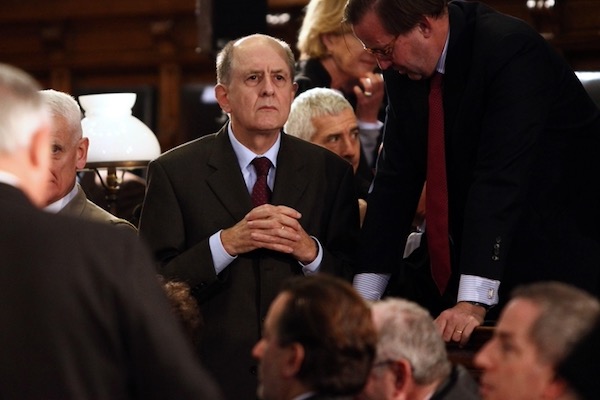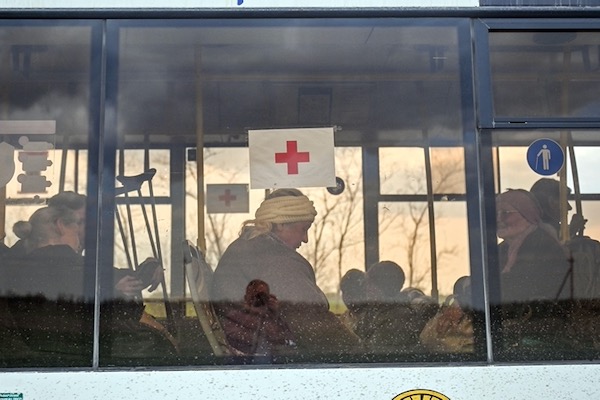In a new escalation of anti-Russian rhetoric, the head of Ukraine’s Greek Catholic Church accused Russian invasion forces in Ukraine of opening what he described as “concentration camps” for captured civilians. Ukrainian President Volodymyr Zelenskyy charged Moscow with abusing the Orthodox Easter and the Pope cancelled planned talks with Russia's Patriarch Kirill.
“The occupiers are dismantling our enterprises en masse in territories they've occupied, exporting them to Russia and turning some factories into concentration camps for so-called filtration exercises, where some are shot, some deported to Russia and some forcibly mobilised into the Russian army”, Major Archbishop Sviatoslav Shevchuk of Kyiv-Halich claimed in a message on Monday.
The archbishop issued the message as Russian forces stepped up their campaign in the south and east of Ukraine, and the US Defence Secretary, Lloyd Austin, pledged an extra $713 million in military aid to Ukraine and predicted after visiting Kyiv with US Secretary of State Anthony Blinken that Ukraine could win the war if properly supported.
Meanwhile, Mr Zelensky accused Moscow of violating Sunday's Orthodox Easter by rejecting a truce and continuing to bomb and shell Ukrainian positions and installations.
“Russia was offered an Easter ceasefire – but the Orthodox world has seen Easter means nothing for the Russian invaders”, the embattled head of state told Ukrainians in a televised message of Monday.
“Why were new blows needed at Easter? This is just the deliberate destruction of life in Ukraine, destruction which did not stop even on the biggest Orthodox feast-day.”
The Russian government rejected calls for an Easter truce from the Pope and United Nations secretary-general, Antonio Guterres, who was expected to visit Moscow and Kyiv this week in an effort to halt the war, which has left tens of thousands dead and at least 12.3 million people internally displaced or seeking refuge abroad since Russia's 24 February invasion.
Missile strikes were reported this week on Ukraine's central Poltava region, with further shelling against Kharkiv, Mykolaiv, Kherson, Dnipropetrovsk and other cities. Russia claimed to have taken the Azov Sea port of Mariupol, but around 1,500 military personnel and civilians were still besieged underground in the huge Azov Steel complex.
Addressing Rome pilgrims on Sunday, two days after confirming to an Argentinian newspaper that he had called off a possible visit to Kyiv and projected June meeting in Jerusalem with Patriarch Kirill, the Pope deplored the war's escalation, adding that he was saddened the “mortal roar of weapons” was being heard louder than “bells announcing the Resurrection”.
Mr Zelenskyy told a press conference in the capital that Francis was “trusted by a large number of people”, adding that he still hoped the Pope would visit his country to help arrange a ceasefire and “unblock humanitarian corridors”.
In an Easter message, the Pope told Kirill humanity currently felt “the full weight of the suffering of our human family, crushed by violence, war and so many injustices”, and urged him to join others in becoming a “true peacemaker”, so “the great Easter passage from death to new life in Christ may become a reality for the Ukrainian people, who long for a new dawn to end the darkness of war”.
However, in a televised sermon on Monday in the Kremlin's Patriarchal Dormition Cathedral, the Russian patriarch praised the historic role of Ivan the Great (1440-1505) in stemming “the invasion of foreigners, civil strife, confusion of thought and loss of national identity”, and in assisting “unification of all Russian lands”.
He added that Russia's defence was “directly related to preservation of the Orthodox faith in the hearts and minds” of its people, and warned “those who, by tradition and by the faith of our ancestors, belong to the Orthodox church”, that they should now “return to our spiritual home” to safeguard their country's “true independence and freedom”. “Today, we must undoubtedly ask the Lord to preserve peace, strengthen our Fatherland and unite all Russia”, Kirill said.



 Loading ...
Loading ...